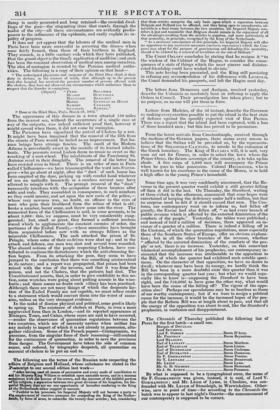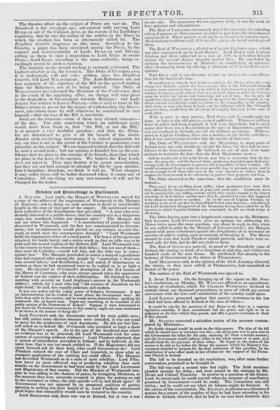Marquis of DOUGLAS. Lord SEYMOUR.
Lord F. OSBORN Baron D'Arcy. Mr. PORTMAN Baron Bryanston..
Lord HEADLEY.
Earl of LANDAFF Baron Matthew.
Earl of TRAQUAIR Baron Linton.
Earl of DUNDONALD Baron Cochrane.
Earl of DUNRA YEN Baron Dunraven.
Sir F. GODSIANSTON Baron Preston.
Sir T. LEN•NAnn Baron Brentwood.
Baron Lyme. MY. LEIGH Mr. G. D. GILBERT Baron Restormel.
Sir J. St. AUBYN Baron Penzance.
By what is supposed to be a typographical error, the name of Sir F. GODMANSTON was given, instead, it is said, of Lord V. GORMANSTON ; and Mr. LEGH Of Lyme, in Cheshire, was con- founded with Mr. LEIGH of Stoneleigh, in Warwickshire. Other- wise, save in point of time—for according to the Chronicle the batch was to appear in last night's Gazette—the announcement of our contemporary is supposed to be correct. The theories afloat on the subject of Peers are van' us. The Standard, a few • evenings ago, not content with turning Lord DURHAM out of the Cabinet, gave, as the reason of his Lordship's expulsion, that he was the author of the articles in the Times- in which the creation has been so strenuously called for. The Brighton Gazette improves on this story. Accordivg to the Gazette, a paper has been circulated among the Peers, by the counsel and instrumentality of Lords DuitHaNr and Do VER, calling on them to sign a requisition to Lord GREY to create Peers,—Lord Gem:, according te the same authority, being ex- ceedingly averse to such a creation. The majority on the second reading is variously estimated. The highest mumber is 25, the lowest G. The Duke of CUMBERLAND, it is understood, will not vote ; neither, says the Brighton Gazette, will Lord MALMESBURY. The Anti-Reformers are not less sanguine of the rejection of the Bill on the second reading than the Reformers are- of its being carried. The Duke of WELLINGTON has informed the Ministers of the Conference, that in the event of his regaining office, no change will take place in the disposition of Government towards Belgium ; and Lady JERSEY has written to Louis PHILIP,—who is said to trust to the Duke's return to power for the means of withstanding the Mouve- ment, into whose arms he will otherwise be constrained to cast himself, —that the loss of the Bill is inevitable.
Such are the rumours—some of them very absurd rumours— of the day. The only conclusion which an indifferent party would draw from them is, that " the Bill, or not the Bill," is at present a very doubtful question ; and that the Minis- try are determined to give ii all the benefit of the doubt. Amidst such conflicting statements, it is indeed impossible for any one that is not in the secret of the Cabinet to pronounce even plausibly on the subject. We are disposed to think that the Bill will be read a second time ; but our opinion is founded less on the con- fidence that we place in the courage of its friends, than that which we place in the fears of its enemies. We believe the Tory Lords dare not reject it. They may destroy it by secret assassination, but they are not bold enough to attempt its life by open murder. Into Committee, therefore, we think it will go. What changes it may suffer there, will be better discussed when it comes out of Committee. Of one thing we may rest assured—it will not be changed for the better.



























 Previous page
Previous page